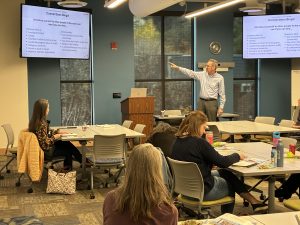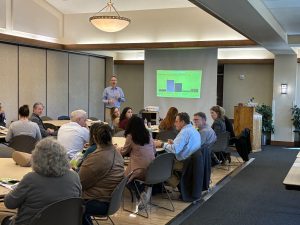“We all want change and we’re collectively moving forward. We just can’t put it into words because we’re too busy at each other’s throats.” This comment, from a participant in one of the workshops on Strengthening Civic Health we did in Colorado last week, reflected many participants’ concerns about political polarization.
League staff, under the leadership of Matt Leighninger, recently published a report called Colorado Action Guide to Civic Health and held three regional workshops in the state to collect and share ideas about techniques for improving civic health in the state. The guide and workshops were funded by two Colorado foundations, the Boettcher Foundation and El Pomar Foundation, and workshop participants included representatives from nonprofits, government, foundations, academia and the private sector.
“Civic health,” said Leighninger, “encompasses all the ways in which people make decisions, solve problems, and build community. It includes two aspects, civic readiness—the skills and capacities people need to do these things—and civic opportunities—all the spaces/infrastructure that help people do these things.”
includes two aspects, civic readiness—the skills and capacities people need to do these things—and civic opportunities—all the spaces/infrastructure that help people do these things.”
The civic health workshops involved a great deal of interaction among the participants, and the discussion among attendees in the workshops varied significantly among the three regions. The workshops took place in Glenwood Springs, a rural area of western Colorado, Wheat Ridge, in Metro Denver, and Pueblo, a town of just over 100,000 people in Southern Colorado, with participants coming from around the region of each city.
At the Glenwood Springs workshop participants from the region talked about ways of improving the sense of community and collaboration for the whole region, with the Roaring Fork Valley encompassing towns with a variety of income levels and assets. Many participants, most of whom were from nonprofit groups, talked about the difficulty of getting people involved, particularly young people, and discussed the possibility of creating a civic ecosystem map.
 The Wheat Ridge workshop was attended by representatives from cities throughout Metro Denver, many of whom have implemented numerous tools for civic engagement. Wheat Ridge was inducted into the All-America City Hall of Fame two years ago for its work with neighborhoods and other engagement processes. Interestingly, this was the only one of the three workshops in which most attendees were from local government.
The Wheat Ridge workshop was attended by representatives from cities throughout Metro Denver, many of whom have implemented numerous tools for civic engagement. Wheat Ridge was inducted into the All-America City Hall of Fame two years ago for its work with neighborhoods and other engagement processes. Interestingly, this was the only one of the three workshops in which most attendees were from local government.
Like the Western Slope workshop, the Pueblo gathering was made up mostly of attendees from the nonprofit sector. Many participants complained about the dysfunction and division in local government in Pueblo and brainstormed ways to improve civic health. “We have a lot more in common than we think,” said one participant, “We need to let go of the red and blue boxes and find our common ground.” Reflecting on the importance of nonprofit groups to civic health and conflicts among elected officials, another participant said “nonprofits are the heart and soul of a community. We need to get over the instinct to disagree. The disagreements are what’s feeding the electeds.”
Many workshop participants had a dim view of politicians and outside forces. “There is a power disparity between those who are elected and those on the ground,” said one attendee. “Civic leadership is not just politics, it’s broader. You can only gain trust if you put boots on the ground with the people.”
The Colorado Action Guide for Civic Health is now available on the League’s website, along with a similar guide for Rhode Island, and League staff will be holding one last workshop for Colorado online. And, of course, the League would be happy to create for other states and to conduct workshops like those in Colorado.



